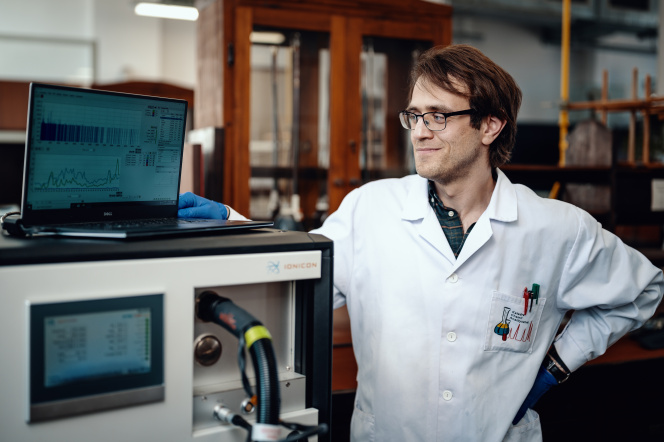Date added: 2021-05-10
The process of frying edible oil under a scientist's magnifying glass

PhD, Eng. Tomasz Majchrzak is the winner of the Gdańsk Scientific Society's 2020 award for young scientists, and one of the three laureates of the Faculty of Chemistry in the Competition of the Committee of Analytical Chemistry of the Polish Academy of Sciences. Both prizes, awarded this year, were received received for his doctoral dissertation in analytical chemistry entitled "A comprehensive analytical approach to assessing the quality of edible oils during the frying process using the electronic nose technique supported by real-time proton transfer reaction mass spectrometry" . The thesis supervisor was prof. Andrzej Wasik, while the auxiliary supervisor – PhD, Eng. Tomasz Dymerski.
The main research work carried out by PhD Tomasz Majchrzak, oscillates around the analysis of volatile organic compounds resulting from the frying process. The chemical composition of oil vapors that are formed when oil is heated is a collection of valuable information. Thanks to the measurements made with the use of an electronic nose, it is possible to assess, among others, the quality and freshness of the oil used for frying. As a result, the qualitative assessment process is significantly shortened – it is not necessary to take a sample of the substance, interrupting the frying process and test it in the laboratory using additional solvents. Sufficiently calibrated electronic nose sensors will assess whether the frying process complies with the standards, and whether the oil quality is appropriate.
– The most important step in the process of assessing oil quality with the electronic nose is to 'train' the sensors to correctly read and interpret the volatile substances they sense. We call it machine learning. A precisely prepared database - adequately numerous and with an appropriate number of variables is the key element here - explains PhD Tomasz Majchrzak.
The speed of operation, non-invasive sample analysis and simplicity of measurement make electronic noses a viable alternative to other popular methods of odor analysis. They can be used not only in the food industry for the assessment and analysis of food, but also in the monitoring of environmental pollution, the pharmaceutical industry, medicine (detection of disease biomarkers), cosmetics or the military (for the detection of combat gases).
However, research is still being conducted on the improvement of e-noses, types of sensors and their calibration. The aim is to increase their sensitivity and improve the durability of devices, which would reduce the cost of their operation.
In his research, PhD Majchrzak also supports another analytical method - proton transfer reaction mass spectrometry (PTR-MS), which is helpful in monitoring the concentrations of individual substances.
– Thanks to the combination of the data set collected as a result of the use of spectrometry and their correlation with data from the electronic nose, we can improve the sensors in the next stages.
Currently, the scientist is conducting a project under the Preludium grant, where he uses the PTR-MS method to track what chemicals are formed in the first seconds of the frying process, when food is placed in the oil, and what is the growth characteristics of these compounds in the further frying process.
The scientist's profile can be found on the website Most Wiedzy.
More about the award in the Competition of the Committee of Analytical Chemistry of the Polish Academy of Sciences

